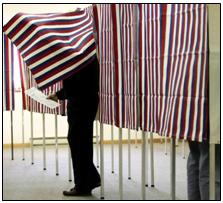By Kevin Mooney
Voters will have the opportunity to express their policy preferences on controversial topics this Election Day through state level ballot initiatives that have been overshadowed by House and Senate races. If approved, these measures could help roll back big government schemes that intrude upon individual liberty and free markets.
Americans living in the most industrialized regions of the country, for instance, have a special stake in the outcome of a California ballot initiative that would suspend implementation of that state’s global warming law until after unemployment drops.
Despite being heavily outspent, the supporters of Proposition 23 appear to be within range of an Election Day victory that could help to unravel job killing regulations in other states that mirror the practices of the European Union. The ballot measure would prevent the Global Warming Solutions Act (AB 32) Gov. Arnold Schwarzenegger signed into law four years ago from going into effect until unemployment drops to 5.5 percent or lower for four consecutive quarters. Without voter intervention, AB 32 will be implemented beginning on Jan. 1, 2012.
A companion measure, Proposition 26, could also short circuit AB 32; it requires a two-thirds super-majority vote in the California State Legislature to pass fees, levies, charges and tax revenue allocations.
Elsewhere, voters will also have the opportunity to take a stand against President Obama’s new federal healthcare law. Proposed constitutional amendments in Arizona, Colorado and Oklahoma would allow for residents to opt out of certain provisions included in ObamaCare.
Other contentious measures include the Arizona Civil Rights Initiative (ACRI). Known formally as Proposition 107, ACRI would amend the Arizona constitution to read as follows: “This state shall not grant preferential treatment to or discriminate against any individual or group on the basis of race, sex, color, ethnicity or national origin in the operation of public employment, public education or public contracting.” Its practical effect would be to ban certain affirmative action programs that give preferential treatment to or discriminate against any individual or group on the basis of race, sex, color, ethnicity or national origin in the operation of public employment, public education or public contracting.
ACRI is part of a larger national effort that began with Proposition 209 in California, which passed in 1996. Ward Connerly, a former University of California regent, who is now president of the American Civil Rights Institute (ACRI), spearheaded the campaign. Similar measures have now passed in Washington, Michigan and Nebraska. In August, the California Supreme Court turned back a legal challenge to Proposition 209 and ruled in favor of its constitutionality.
In response to the so-called Employee Free Choice Act (EFCA), which would replace the use of secret ballots in union elections with a card check system, pro-business groups are advancing ballot propositions in Oregon, Arizona, South Carolina, and Utah.
All told, there are 155 measures on the ballot in 36 states, government records show.
Kevin Mooney is a contributing editor to Americans for Limited Government (ALG) News Bureau.


